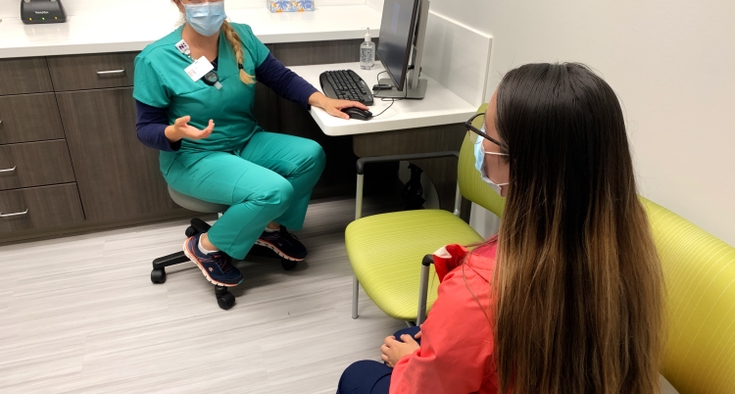Birth control is more accessible, affordable and effective than it ever has been. The CDC has reported that more than 60 percent of women of reproductive age use contraception. As the choices have grown, so have the questions and decisions.
We asked 10 millennial women to bring their most burning questions about all things birth control. And we teamed up with Dr. Cheryl Onwuchuruba (pronounced On-wu-chew-ru-ba) of Novant Health Randolph OB/GYN – Charlotte to deliver the answers.

On finding the right birth control method and how it changes your body
How do you know which type of birth control is best for you?
Dr. O: There are multiple options. What I typically do for my patients is break it down into each specific type of birth control—intrauterine device (IUD), birth control pills, vaginal ring, implants, condoms, etc. Then we look at the pros of cons of each one and base it off the patient’s personality and what she is looking for. There is typically something that works for everybody if you are willing to try.
What are some things you take into consideration when talking about birth control options with your patients?
Dr. O: I make recommendations for my patients based on what I know about their health as a whole. For instance, if you know someone has a history of migraines, then an estrogen-containing option is not a great option as this can worsen her migraines and cause worse health issues. Or let’s say someone has terrible acne—that would be someone I would want to give something containing estrogen because we know birth control may actually help their acne. It’s factors like that I take into account before exploring options with them.
You may also have someone with very painful periods or polycystic ovary syndrome (PCOS) and may skip several months at a time or have very heavy periods and lose a lot of blood. You might have someone who needs to treat those issues with birth control options.
Can birth control affect your sex drive?
Dr. O: For some women, taking birth control does affect your libido. Estrogen is a hormone found in birth control and can lower sexual desire. Birth control methods that have this hormone can include most pills, the patch and the vaginal ring. To balance this, you can talk to your provider about what options contain lower amounts of estrogen and may have less impact on your sexual desire.
What about a male birth control method?
Dr. O: I do think that would be a fantastic idea if for no other reason than at least couples could open up the conversation. I think men still view it as a women’s issue. So the question is, would men actually be willing to take it, especially if there was a side effect of any sort? The most effective birth control for men right now is a vasectomy.
What birth control options do you recommend?
Dr. O: I’m a big proponent for an IUD. Number one, it takes user error completely out of the picture, and the failure rate is only about 0.4 percent. So in that aspect, it is fantastic. They are approved for those with heavy periods. However, the insertion is definitely uncomfortable.
When it comes to other options, implants (usually inserted under the arm) will last you three years and are also extremely effective. They are very easy to put in, so patients really like it from that perspective.

Fertility issues and birth control
How long should it take you to become pregnant after you stop using birth control?
Dr. O: It depends on what type of birth control you use. The copper IUD has no hormone in it or suppression of ovulation, so you can get pregnant as soon as you take it out. While the Mirena IUD has progesterone in it, it also does not suppress ovulation and therefore there is an immediate return to fertility. With the vaginal ring and pills, I tell patients to stop those about 30 days before they would start trying to conceive. With the Depo-Provera injection, it could take several months to return to fertility so I typically recommend stopping about 6 months prior to conception.
Does how long I’m on birth control have anything to do with my ability to conceive, or will I increase my chances of having fertility issues?
Dr. O: I have a lot of women in their late 20s-early 30s who come in, and they’ve been on birth control since they were in high school. The concern is, ‘I’ve been on this for five, 10, 15 years—will it impact my fertility because I’ve been on it for so long?’
A lot of people start birth control in their teens, and they forget why they started birth control in the first place. Maybe it was irregular or painful periods. And now you stop birth control, and your periods are doing all these weird and crazy things you are no longer used to because you’ve had this hormonal period for the last 15 years. Like when you have a cold and take medicine to help the symptoms, but there is still an underlying cause. These underlying causes such as PCOS or endometriosis can cause infertility, but they are often treated with contraception during the time when you are not trying to become pregnant.
Having 'the talk'

How and when should partners talk about birth control?
Dr. O: I think the first thing partners have to be willing to talk about is, ‘Are you ready to have a child?’ Make sure you have the discussion before becoming intimate. In a healthy and mature relationship, that conversation is actually easier than one would think.
When you have multiple sexual partners and meet a new partner, how do you have a conversation about their sexual health status and when it’s OK to stop using condoms? To talk about stopping using condoms, sexual health, sexually transmitted diseases (STDs), etc.?
Dr. O: You have to be able to have an honest conversation with your partner about using condoms until you get to a place where you feel this is a truly monogamous relationship and you really trust that person. Remember, when you sleep with someone, you are sleeping with everyone they slept with. Most STDs are treatable, but they could have long-term effects.
What if someone wants to get tested for an STD?
Dr. O: In most cases, that is very easy. With some STDs like chlamydia and gonorrhea, you can do a vaginal swab or test a urine sample. For others, including HIV, that entails blood work. If you are coming in just for a screening—let’s say you met somebody new, and you want to get screened—then we can do that relatively quickly.
Now let’s say you’ve been with somebody who calls you and says, ‘I tested positive for X, Y or Z.’ We will go ahead and order the treatment and do testing on the same day. And if you have a partner who tested positive, many physicians are willing to prescribe for both parties to limit the spread of the disease if your partner does not have access to healthcare resources.
Do you have more questions for Dr. Onwuchuruba, or want to talk about birth control options, planning for a baby or how to deal with STDs and relationships? She would love to hear from you and is currently accepting new patients.
Whether you’re looking for an OBGYN, primary care provider or a specialist, you can find care at Novant Health. Visit NovantHealth.org/Doctor to find care in seconds.
This story was created in partnership with CharlotteFive.












